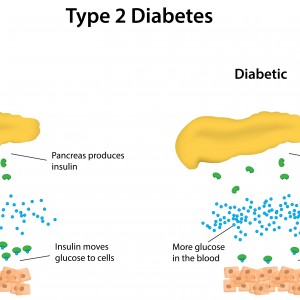Predicting who may develop type 2 diabetes may help with prevention and treatment of the disease. A new study, titled “Association Between Familial Hypercholesterolemia and Prevalence of Type 2 Diabetes Mellitus” recently appeared in the Journal of the American Medical Association. The report suggests that one predictor for the development of type 2 diabetes might actually be whether or not your family has a history of high cholesterol.
About 29.1 million people in the United States have diabetes with an estimated 8.1 million who are have not received a diagnosis. Type 2 diabetes is the most common form of diabetes, accounting for about 90-95 percent of all diabetes. Type 2 diabetes is charac terized by insulin resistance, which is the inability of the body to use insulin properly. To make up for this deficit, the pancreas will over-produce insulin — but over time blood glucose will build up, causing loss of bodily energy and tissue damage. Type 2 diabetes occurs most frequently in African Americans, Latinos, Native Americans, and Asian Americans/Pacific Islanders, as well as the elderly.
terized by insulin resistance, which is the inability of the body to use insulin properly. To make up for this deficit, the pancreas will over-produce insulin — but over time blood glucose will build up, causing loss of bodily energy and tissue damage. Type 2 diabetes occurs most frequently in African Americans, Latinos, Native Americans, and Asian Americans/Pacific Islanders, as well as the elderly.
Led by Joost Besseling, MD, of the Department of Vascular Medicine, Academic Medical Centre in Amsterdam, researchers conducted a large study to determine whether people with a family history of high cholesterol (hypercholesterolemia) are more or less likely to also have a history of type 2 diabetes. 63,320 people were who had undergone DNA testing for hypercholesterolemia were studied. Genes that confer risk for this medical problem include those that affect the low density lipoprotein (LDL) receptor as well as a cholesterol-carrying protein known as apolipoprotein B (APOB).
Surprisingly, type 2 diabetes was actually less like to develop in people with a family history of hypercholesterolemia. In their report, the scientists stated “In a cross-sectional analysis in the Netherlands, the prevalence of type 2 diabetes among patients with familial hypercholesterolemia was significantly lower than among unaffected relatives, with variability by mutation type.”
The study could actually indicate that the LDL receptor and its function is associated with type 2 diabetes. The LDL receptor is already known to be associated with artherosclerosis, the build-up of cholesterol in the blood, causing plaques. According to Besseling and colleagues “If this finding is confirmed in longitudinal analysis, it would raise the possibility of a causal relationship between LDL receptor-mediated transmembrane cholesterol transport and type 2 diabetes.”
The finding could also spur the development of type 2 diabetes medications that specifically target the LDL receptor and the transport of cholesterol and the LDL receptor.


